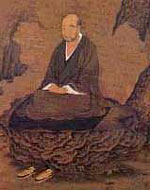Koso Wasan 45
T'an-luan teaches that we reach the Buddha-land of happiness
Solely with the Name - the unsurpassed gem -
And true shinjin,
For those born there follow no other way.
Nembutsu-Shinjin

This verse is very striking; and very important. It speaks of the way that shinjin and nembutsu are a single fact. In the Kyo Gyo Shin Sho we read that 'the Name is the substance of shinjin'. In other words the manifestation of shinjin is the nembutsu. Namo Amida Butsu and shinjin are the same thing. In traditional terms, the nembutsu is the form (Sk. rupa) of the underlying reality (Sk. nama), which is shinjin.
The idea that the Name and shinjin are somehow different is perpetuated by the way we speak about them. For example, the common refrain, 'Shinjin is the cause of birth; the nembutsu is the act of thanksgiving,' is, of course, correct because shinjin is essential. But it is not true shinjin if its natural expression is not associated with the identity of its source, the Name, which, in turn, is the embodiment of the Primal Vow.
Without the Name, we are not able to accept Amida Buddha's shinjin, the shinjin of the Other Power.
Truly we know that without the virtuous Name, our compassionate father, we would lack the direct cause for birth. Without the light, our compassionate mother, we would stand apart from the indirect cause of birth. Although direct and indirect causes may come together, if the karmic-consciousness of shinjin is lacking, one will not reach the land of light. The karmic-consciousness of true and real shinjin is the inner cause. The Name and light - our father and mother - are the outer cause. When the inner and outer causes merge, one realizes the true body in the fulfilled land. Therefore master [Shan-tao] states:
[Amida] takes in and saves all beings throughout the ten quarters with light and Name; [Amida] brings sentient beings to realize shinjin and aspire for birth.1
'The direct cause for birth' means that it is the Name which awakens shinjin. When we receive the Name into our hearts, shinjin awakens and we naturally say the Name as its expression. The Name is the form that Amida Buddha takes in order to approach us in a way that engages us fully.
If people say the Name with self-power in the attempt to attain birth in the Pure Land by the accumulation of merit, then - as we shall see in the Shozomatsu Wasan -, they will be born in a pure land of their own contrivance ('the borderland') and will not attain nirvana immediately upon birth. In response to someone who criticised another nembutsu follower as someone like that, Shinran Shonin wrote:
In answer to your question about the nembutsu: it is completely mistaken to look down upon people who believe in birth through the nembutsu, saying that they are destined for birth in the borderland. For Amida vowed to take into the land of bliss those who say the Name, and thus to entrust oneself deeply and say the Name is to be in perfect accord with the Primal Vow. Though a person may have shinjin, if he or she does not say the Name it is of no avail. And conversely, even though a person fervently say the Name, if that person's shinjin is shallow he cannot attain birth. Thus, it is the person who both deeply entrusts himself to birth through the nembutsu and undertakes to say the Name who is certain to be born in the true fulfilled land.
In short, although persons say the Name, if they do not entrust themselves to the Primal Vow that is Other Power, they will surely be born in the borderland. But how can it be that those who deeply entrust themselves to the power of the Primal Vow are also born there? Please say the nembutsu fully understanding what I have explained above.2
Shinran here upholds and re-iterates, in pure form, the thought of his teacher Honen Shonin. Shinjin is essential... but shinjin without the Name is not the shinjin of Other Power, Amida Buddha. It is another kind of self-generated belief that has nothing to do with the Primal Vow.
The relationship between Name and shinjin can be expressed in very elegant, accurate, yet simple terms. One such explanation was given by Hisao Inagaki in the introduction to the Ryukoku Translation Center publication Shoshinge:
To utter the Nembutsu and to trust in Amida are not separate. One who trusts in Amida thinks of Him, and he who thinks of Him utters His Name.3
1: CWS, p. 54.
2: CWS, p. 539.
3: Ryukoku Translation Series, Vol 1, p. 5